The United States issued its strongest public rebuke toward Israel since the start of its war with Hamas, warning that American policy on Gaza will be determined by whether Israel takes steps to address the safety of Palestinian civilians and aid workers.
US President Joe Biden told Israeli Prime Minister Benjamin Netanyahu that Israel must take immediate action to reduce civilian harm and suffering, the White House said after the two leaders spoke by phone.
Mr Biden also told Mr Netanyahu, in a call lasting less then 30 minutes, that an immediate ceasefire in the region was essential and called on Israel "to conclude a deal without delay" with Hamas to bring Israeli hostages home, nearly six months after the Palestinian militant group's 7 October attack.
The White House statement reflected a sharp change in Mr Biden's tone and, for what appears to be the first time, a set of strings attached to continued US support.
By suggesting a shift in US policy toward Gaza was possible if Israel did not address the humanitarian situation in the Palestinian enclave, Mr Biden channelled his own frustration along with mounting pressure from his left-leaning political base to stop the killings and alleviate hunger among innocent civilians.
The president "made clear the need for Israel to announce and implement a series of specific, concrete, and measurable steps to address civilian harm, humanitarian suffering, and the safety of aid workers," the White House said in its statement.
He also "made clear that US policy with respect to Gaza will be determined by our assessment of Israel's immediate action on these steps," it added.
On Monday, Israel launched an attack that killed seven World Central Kitchen (WCK) aid workers in Gaza.
The incident has stoked Western anger at the mounting civilian toll in the Palestinian enclave, especially as the staff killed included Australian, British and Polish citizens along with a US-Canadian dual national.
The White House has described Mr Biden as outraged and heartbroken by the attack but, prior to today’s call, the president had made no fundamental change in Washington's steadfast support for Israel in its conflict against Hamas.
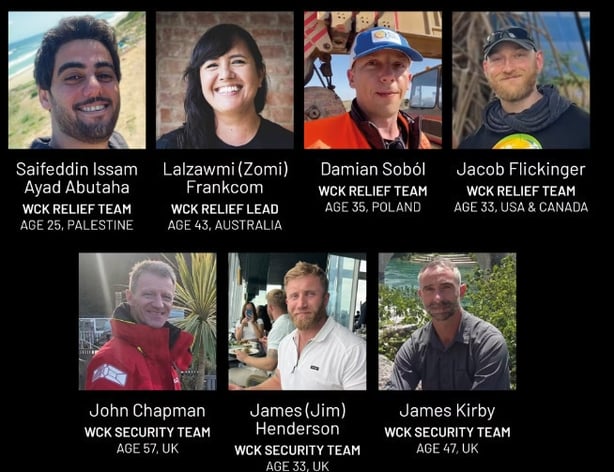
In Brussels, US Secretary of State Antony Blinken called on Israel, as a democracy, to place the highest value on human life and increase the flow of aid to Gaza, adding that this week's "horrific attack" on WCK workers in Gaza must be the last such incident.
"Right now, there is no higher priority in Gaza than protecting civilians, surging humanitarian assistance, and ensuring the security of those who provide it. Israel must meet this moment," Mr Blinken told reporters.
Celebrity chef Jose Andres told Reuters in an emotional interview yesterday that the Israeli attack had targeted his aid workers "systematically, car by car".
WCK suspended its Gaza operations and sent ships laden with undelivered supplies back to their Mediterranean port in Cyprus.
Other aid groups have curtailed or reassessed their operations, with the UN on Tuesday pausing nighttime movement for the "evaluation of the security issues".
The International Committee of the Red Cross also warned that "humanitarian aid organisations are unable to carry out their work safely".
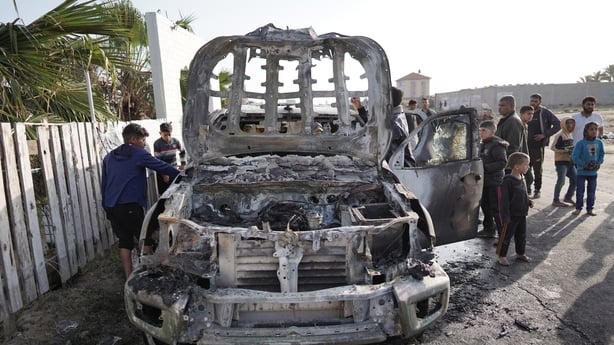
Asked to respond, Israeli government spokesperson Raquela Karamson said during a media briefing: "This was unintended."
A military investigation was under way, she said: "In the coming weeks, as the findings become clear, we will be transparent and share the results with the public."
"Clearly something went wrong here, and as we learn more and the investigation reveals exactly what happened, and the cause of what happened, we will certainly adjust our practices in the future to make sure this does not happen again."
'There is no war without mistakes'
Israel Ziv, a retired army general who formerly commanded the Gaza division, said the incident may have resulted from the military enabling more junior officers to authorise air strikes.
Whereas during quieter periods such an operation would require a green light from a division commander or a general in charge of regional forces, he said, "in wartime the situation is utterly transformed, because the number of threats is never-ending".
"If you don't allow greater latitude, further down the ranks, on opening fire, you endanger the troops and the war."
Mr Ziv noted that Israel, which went to war after Hamas gunmen rampaged in its southern towns and army bases on 7 October last year, has been fighting both to destroy the Palestinian Islamists' military capacity and deny them access to humanitarian aid sent to Gaza.
"That complicates the situation," he told Reuters.
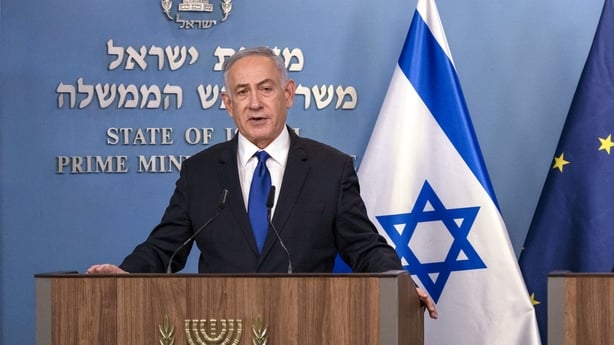
Some local media reported, based on unnamed sources, that the convoy was hit repeatedly from the air despite having coordinated its route in advance with the military - possibly due to a false belief that gunmen were aboard it or close by.
Israel said it would adjust tactics in the Gaza war after the attack, and that inquiry findings would be made public soon.
As a preliminary move , Israel said it would set up a joint operational coordination room with humanitarian agencies, located within the military's Southern Command - where Gaza missions are directly managed.
More than 33,000 Palestinians have been killed in the war, Gazan medical officials say. Hamas has said 6,000 of its fighters are among the fatalities. Israeli officials say the Palestinian combatant death toll is more than twice as high.
"There is no war without mistakes - quite the opposite," Mr Ziv said. "But usually in this kind of combat the number of non-combatants killed, in relation to enemy dead, is higher than what the IDF (Israel Defence Forces) has caused (in Gaza)."
US Defence Secretary Lloyd Austin also "expressed his outrage" at the aid workers' killings - which Israel has admitted to and pledged to investigate - in a phone call with his Israeli counterpart Yoav Gallant, the Pentagon said.
Mr Austin stressed the need to protect aid workers and civilians and for "a rapid increase of aid" into Gaza, "particularly to communities in northern Gaza that are at risk of famine".
'Concern' over Rafah plan
Mr Netanyahu has vowed to destroy Hamas, including in Rafah, and bring home the hostages, while claiming they will move the more than one million civilians in the city out of harm's way first.
Mr Austin said the aid charity "tragedy reinforced the expressed concern over a potential Israeli military operation in Rafah, specifically focusing on the need to ensure the evacuation of Palestinian civilians and the flow of humanitarian aid".
The Israeli army said Mr Gallant and Mr Austin had discussed "plans to expand operations to address Hamas' remaining battalions and military capabilities".
It said the two had also "discussed the threat posed by Iran and its proxy activities", after Israel was blamed for the Damascus strike on Monday that killed seven Iranian Revolutionary Guards, two of them generals.
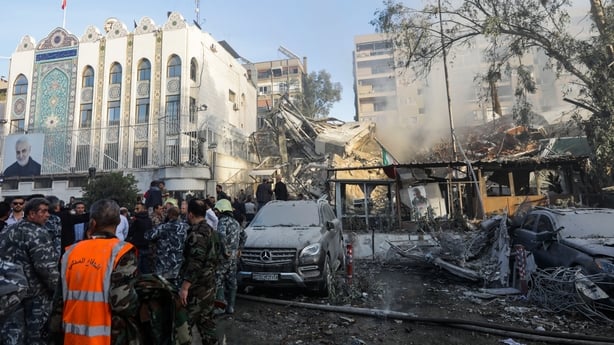
Iran's Supreme leader Ayatollah Ali Khamenei vowed in a social media message that "with God's help we will make the Zionists repent of their crime of aggression against the Iranian consulate in Damascus".
The Israeli military has said today that, after a "situational assessment, it was decided to increase manpower and draft reserve soldiers to the IDF Aerial Defence Array".
As Mr Netanyahu has fought the war, he has faced intense domestic pressure from the families and supporters of the hostages still held in Gaza, and from a resurgent anti-government protest movement.
A street protest in Tel Aviv to highlight the hostage crisis featured signs that warned "they are out of time", and a gagged man whose hands were tied with wire.
War cabinet member Benny Gantz, a centrist political rival of Mr Netanyahu, has demanded that snap elections be held in September, a call rejected by Netanyahu's Likud party.
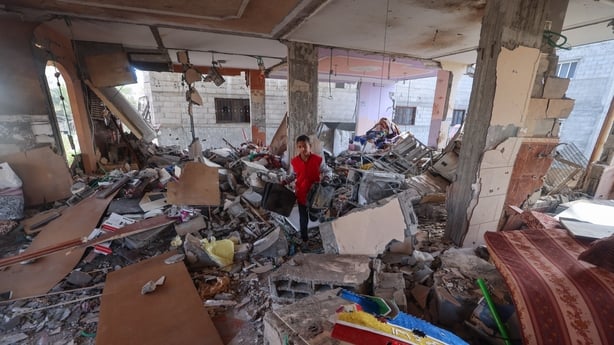
Talks for a ceasefire and hostage release deal have stalled, with both sides blaming each other.
An informed source within Hamas told AFP that "there is nothing new in the latest negotiating round, and the occupation (Israel) continues to be stubborn, procrastinate and disrupt any ceasefire agreement".
'Food for our families'
In Gaza, where vast areas have been reduced to rubble by Israel, 2.4 million Palestinians have struggled on under Israeli bombardment while enduring dire shortages of food, water, fuel and other basic supplies.
The charity Oxfam said that people in northern Gaza have been forced to survive on an average of 245 calories a day - less than a can of beans, and a fraction of the recommended average daily 2,100 calorie intake per person.
In Gaza City, Palestinians spent the night near an aid delivery spot, hoping to secure a bag of flour.
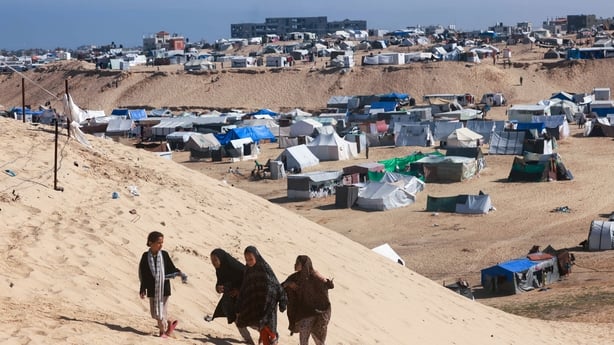
"We sleep on the streets, in the cold, on the sand, enduring hardship to secure food for our families, especially our young children," one man told AFP.
"I don't know what else to do or how our lives have come to this."
